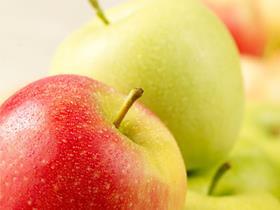
The apple industry has written to environment minister Owen Paterson to request changes in the way research on the health benefits of apples is reviewed.
Adrian Barlow, chief executive of English Apples and Pears, said the current system of looking at research individually rather than collectively is having a damaging effect on apple sales.
“The methodology they use to review research at the moment requires a level of proof which is very hard to achieve. There needs to be a change, the Commission needs to take responsibility for monitoring current research and assess conclusions on a collective basis rather than individual,” he said.
“There have been lots of projects undertaken by organisations of authority that have concluded that the consumption of apples affects the development of several serious diseases.
“Collectively they provide very, very strong support for the health benefits of eating apples.”
Barlow said that the apple industry can officially only say that apples are low in sodium, and low sodium results in low blood pressure, not that eating apples can lower blood pressure.
Similarly, it is permitted to state that apples are low in fat, and reduced fat intake can lower cholesterol, but it is not permitted to state that eating apples can lower cholesterol.
Barlow said these regulations are against a background of falling consumption for fresh produce in the UK and wider EU.
He cited recent research that shows a relationship between eating apples and preventing or reducing the effects of some cancers, improving heart disease and circulatory problems, reducing the effects of lung disease including asthma and helping to avoid Type 2 Diabetes.
“It is ironic that the government says we must eat 5 A DAY, and yet we can’t give consumers the information as to why they would benefit from doing this,” he said.
The letter from trade body English Apples and Pears said growers believe that “ungagging” information on the health benefits of apples would help to convince consumers that eating apples can have a beneficial effect.
In turn this would improve the health of consumers and reduce public health costs.
Barlow added: “The inability to make these claims is very damaging. It is having a damaging effect on the sales of apples.
“The government needs to reassess the whole area of health claims taking into consideration the combined effect of studies, and working very closely with the industry to assess where further research may be beneficial.”
Barlow said he is “certainly” expecting a response from Paterson on the issue, and has been liaising with European trade body Freshfel who he said has given full support.
But he was keen to emphasis that the letter is in no way attacking the European Commission or the European Food Safety Authority (Efsa), and the industry is entirely supportive of action to prevent spurious health claims.
In 2010 the European Commission and Efsa clamped down on health benefits about food and ruled that companies were no longer able to use scientifically unprovable claims.
Claims such as the benefits of cranberries on urinary tract infections in women and the effect of persimmons on vision were among those banned under the new criteria.



